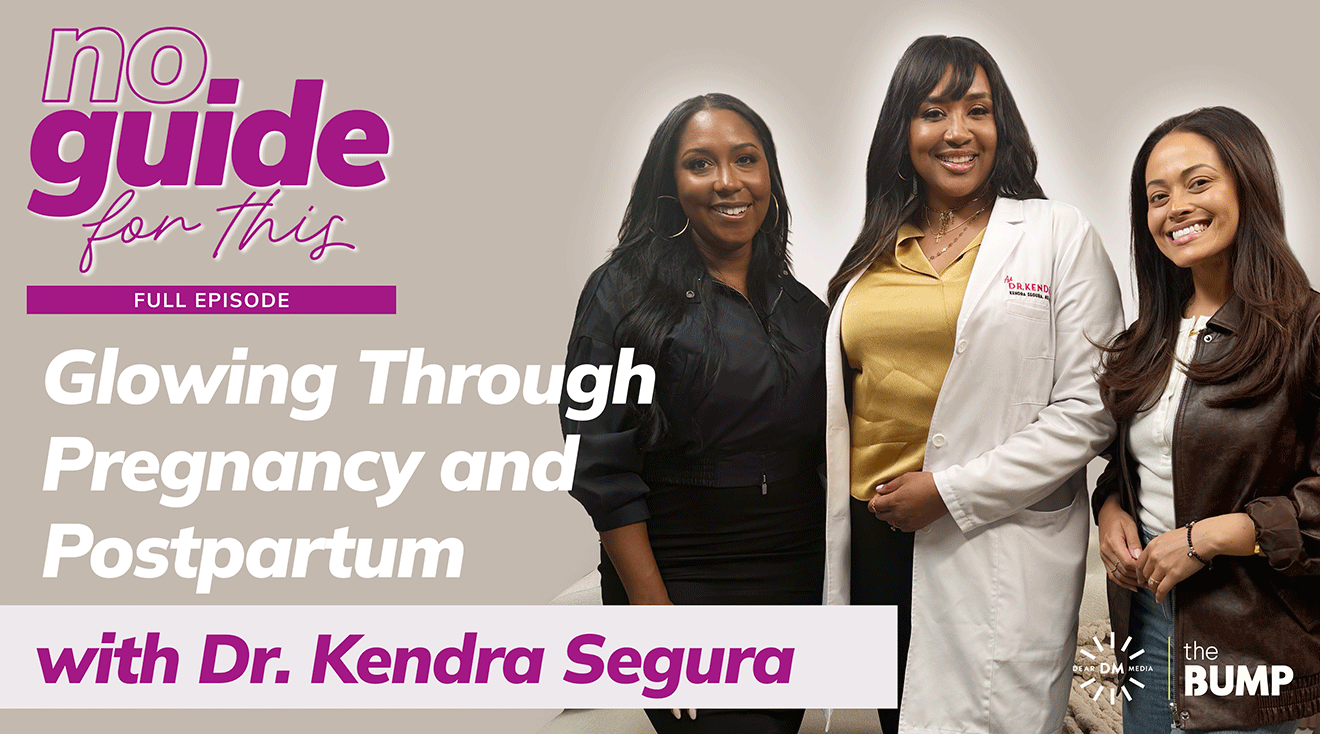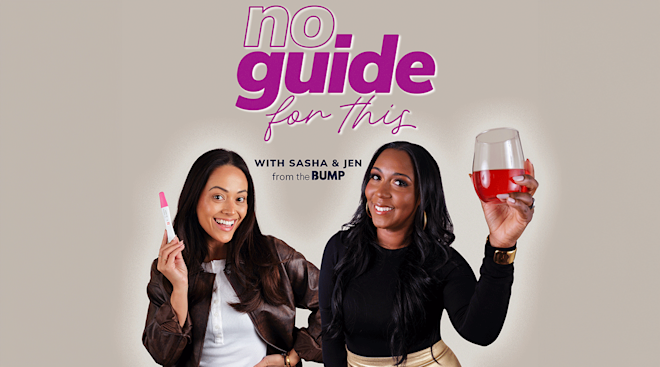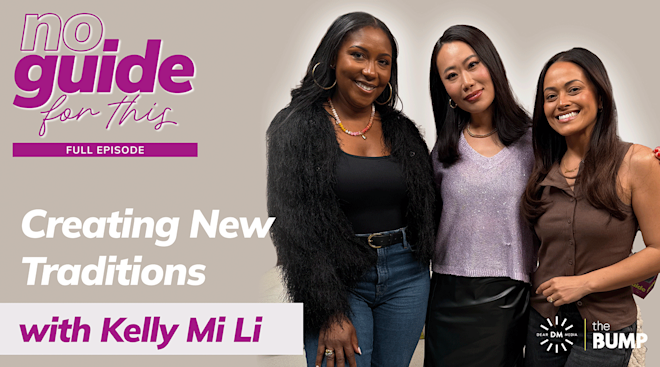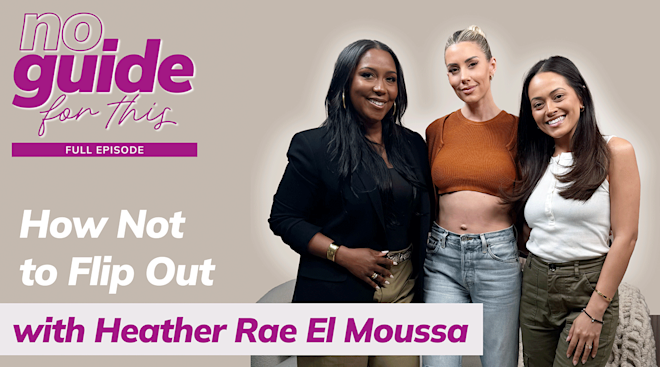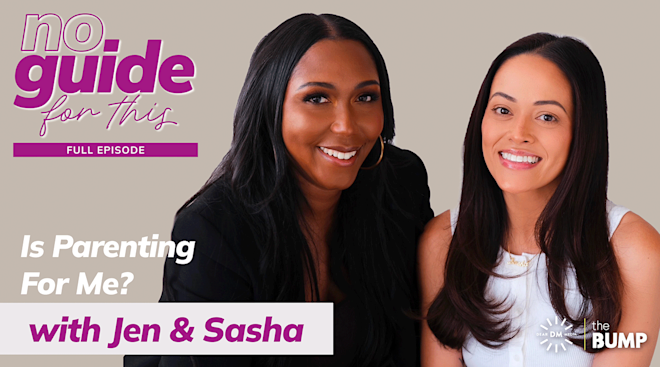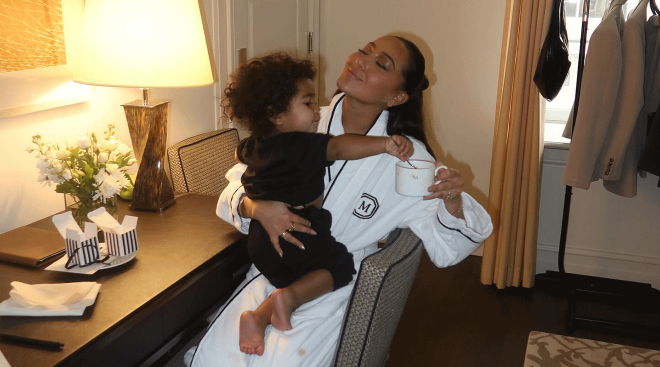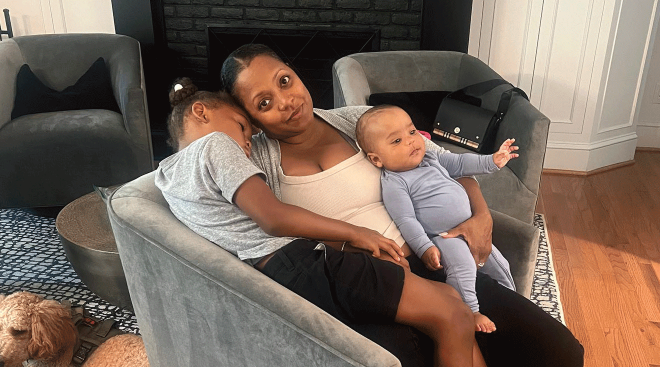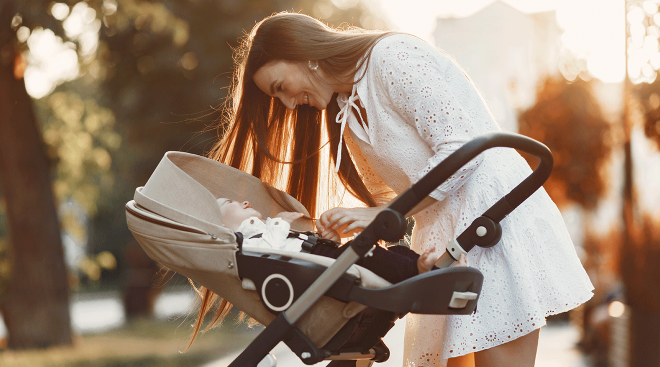‘No Guide for This’ Episode 4: Glowing Through Pregnancy and Postpartum
Kendra Segura, MD, may be a high-powered ob-gyn—but when it comes to issues like postpartum body image and juggling parenting and her career, she’s extremely vulnerable and relatable. In a wide-ranging conversation with No Guide for This hosts Jen Hayes Lee and Sasha Smith, she leaves no stone unturned, talking about everything from what it was really like to star on Married to Medicine: Los Angeles to the time constraints of being a working mom to her 5-year-old son Hart. And don’t forget the spicy topics, like mommy makeovers and why boys tend to look like their dads.
Most importantly, Segura shares her purpose and what drives her. She’s on a mission to change the way we talk about pregnancy, maternal health and healthcare disparities—especially for Black women, and she doesn’t shy away from topics like implicit bias in the healthcare system. Having a front-row seat to her patients’ struggles has given her a unique look at women’s health and has inspired her to launch her concierge medical practice, Ask Dr. Kendra, where she’s working one-on-one to provide personalized, accessible care. If you’re looking to be inspired and learn about how to advocate for yourself—and laugh—this is the episode for you.
Ready to tune in? The No Guide for This podcast is streaming on Apple Music and Spotify, with a total of eight episodes this season. Check out the No Guide for This vodcast on YouTube, and keep scrolling to read the transcript.
Kendra Segura, MD, is a board-certified ob-gyn, entrepreneur, author, and motivational speaker dedicated to women’s health and empowerment. She founded Ask Dr. Kendra, a concierge medical practice providing direct ob-gyn care, as well as Total Body Aesthetics LA and Hype HairLA. A South Los Angeles native, she has worked with major healthcare institutions, including Kaiser Permanente and the LA County Department of Public Health. She also co-authored The Chronicles of Women in White Coats to inspire women in medicine. Beyond her career, she is a devoted wife, mother and former star tennis player.
Jen: Hi, I’m Jen.
Sasha: Hi, and I’m Sasha, and you’re listening to No Guide for This, a podcast where we talk about all things adulting and adulting with kids. Jen: That is right. And y’all, today I’m so thrilled to introduce our guest Dr. Kendra Segura. Welcome to the studio! Dr. Kendra: Thank you, thank you. I just want to say thank you for having me be a part of The Bump, and thank you for having me be a guest on the first season of many more.
Jen: Let’s manifest that. Many more! And we couldn’t have done a first season without you because not only do we have the privilege of working with you on The Bump, but you are one of our medical experts that makes sure all of our facts and information about healthcare are right. She’s a board-certified ob-gyn, she’s got Ask Dr. Kendra, she’s an entrepreneur with Hype HairLA, a medical concierge and you’re also a mom, you’re a wife…
Dr. Kendra: Love you, Hart!
Jen: Aw, yes, give all the shoutouts! And we just have so many questions for you. We’re going to get into all of the things today.
Dr. Kendra: I’m excited. Let’s get into it.
Jen: Yes, yes, yes. So today we’re going to kick things off with a fun little icebreaker that we like to call Can’t Make This Up. Sasha, what do we have today?
Sasha: We love to talk about anything on social, anything that’s trending, especially in the parent department. But I want to talk about something that I saw Meghan Trainor, the singer, she posted something about her son looking “identical” to the father. Do you think that’s very common that boys tend to look like their father? Is it medical that that mostly happens? Because I tell you, Meghan Trainor’s son literally looks just like the dad.
Dr. Kendra: Well, I do have an opinion on that. So Hart looks exactly like his father. But normally, they say that it’s the girl who looks like the dad, and the son looks like the mother. But studies show that back in the day, kids that survived and the men that stayed with families were more so in the families where the kids looked just like the dad. So maybe you do see that more often because in evolution, they didn’t have DNA back then, so it was, okay, this is my kid. I really feel that that is survival. Sasha: That’s such an interesting take. I never thought of that.
Jen: Who needs Maury Povich when you have evolution?
Sasha: And what about your sons, Jen? You have three.
Dr. Kendra: Boy mom! Jen: I have three sons. My oldest son looks like me. Really and truly, all three of my sons look like each other. They actually don’t look exactly like my husband or like me, but they look like each other.
Dr. Kendra: So like a mix.
Sasha: They all got the same mix, blend—they are definitely siblings, you can tell.
Jen: If the recipe, the ingredients, were the same, but maybe you put a little bit more of this, a little dash of that, and they came out different. But hold on, Dr. Kendra, I’ve heard a slightly different twist on evolution than what you said. I’ve heard—and this is maybe the messy version of it—that the reason that kids come out looking like the dad is so the dad knows that it’s theirs.
Dr. Kendra: Right, and then that increases the chances of him taking care of the children.
Jen: Well, whatever it takes.
Dr. Kendra: So that’s evolution, where kids come out looking like their dads. So I look like my father.
Jen: Same concept. I love that. So we’d also love to hear, how old is Hart now?
Dr. Kendra: He’s five. Five-and-a-half.
Jen: You’ve got a five-year-old. Five-and-a-half-year-old!
Dr. Kendra: And we’re married. He’s in his hater phase of his father. Anytime Hobart, my husband, tries to get close to me, no matter where he is, he’ll run and get in-between.
Sasha: Oh, he’s very protective of his mom.
Dr. Kendra: Then he’s into, like, how babies are made. He’s like, “How are babies made?” I was like, “The stork!”
Jen: That’s funny coming from an ob-gyn! Then he’s like, “Well, what is your job, Mom?”
Dr. Kendra: He watches all these videos—we have to be careful what they’re watching—because the minute you take your eyes off what they’re doing… I caught Hart watching a game, I don’t know if you guys see it on YouTube, but it’s in a lot of commercials, and the girl had a badookadook, and his job was to race and eat all this candy. And her badookadook got bigger and bigger and bigger… So I’m looking at this like, “What?! Oh, no! We gotta do kids’ YouTube! What are you watching?” We really got to watch that, because that’s going to affect their behavior.
Sasha: And they’re really smart. Like, kids now know how to open YouTube and do all the things on the phone, I mean, you can’t even read yet!
Jen: We’re actually releasing The Future of Parenting report and one of our themes is connected parenting. So it’s how technology brings all this great innovation and creativity that our kids could tap into, but of course there’s the other side of it, and the balance that’s needed to make sure they’re not consuming things they shouldn’t be. I looked over at my kid and he was watching some kind of hero who was blowing up cars, but the music sounded like it was at a playground or an amusement park. It was a graphically violent video. So you have to look over and see because you never know.
Dr. Kendra: Have you heard of Sprunkies?
Jen: No, what is that?
Dr. Kendra: It started as an app, as a beat machine, and someone made characters for the beats, and if you listen to it, it sounds good. But it goes from normal mode to gory, where you actually see them stabbing, shooting each other, so I had to get Hart off of that.
Jen: Technology and kids today, there’s a lot of good but we have to make sure that we monitor it too. Because sometimes you get the good with the bad, so it’s our job to just stay on it.
Dr. Kendra: I’m all for our kids keeping up with technology. I’m excited about AI. I don’t ever want Hart to fall behind. I was in that generation where we didn’t have a computer, probably “The Last of the Mohicans” who didn’t have that growing up, so I definitely experienced a lot of computer anxiety. Sasha: The technology came out quick. It was like, computer and then phone and this, and we had to learn all of it very quick. Dr. Kendra: And I promised myself, I’ll never fall behind, I’ll keep up with the times and always be flexible in life, at my job, and don’t get left behind. Because if you’re against AI, it’s sad because it’s going to be integrated into everything.
Sasha: It’s about tapping into it, finding the balance between the good and the bad. We also like to ask people their assumptions before they have kids, and me, that’s one of the things I assume, that they’re not going to have a phone. But now that I see my friends with kids who’re like, “Just take the phone! Stop screaming at us!” That was something my friend group all says, we assumed we were never going to give them any technology or phones, but my assumption was very wrong. Sometimes you need that technology just to sit still, be at a restaurant without screaming. What about you, what was something you assumed before having kids?
Dr. Kendra: There are lots of things. I had the benefit of being an older mom. I had Hart at 39. I’m an ob-gyn, so there’s no mystery about being pregnant, about the birthing process, because I have a front-row seat. All my friends, they had kids, they’re getting ready to go to college—what I didn’t expect was that you really don’t get that “me time.” When you’re single for so long—and, of course, I’m married, Hobart’s self-sufficient—but let’s just say, I have a tough call at work, I come home the next day. It’s important when you come home to gather yourself, gather your thoughts, like, “What the hell happened?” But when you have kids, when you need some time to quiet the noise, you don’t get that.
Jen: It’s your next job. Your Mom job.
Sasha: That doesn’t get talked about a lot. That you don’t get that “me time.”
Dr. Kendra: So I value, like, 30 minutes. When the boys aren’t home. People don’t talk about that. I don’t get the recovery. And this is mostly on the women. The whole mental load that we carry.
Sasha: I feel like that’s what women do naturally. We’re not just thinking about the now. We’re thinking of what happened earlier, what happened later, what we need to do in 10 minutes, in a year, next week, all the time.
Dr. Kendra: I have to know where Hart is. Me being here, I have to know that he’s accounted for. And I didn’t know that. No one told me that, I have a partner here, we’re legally married, the kid is basically his twins, but when we’re in the house you’d think he didn’t have a father because he’s just all over me.
Sasha: You’re doing most of it.
Dr. Kendra: So Hobart gets to work out, but I’m at home doing my medical reviewing, and he’s like, pay attention to me Mom. He closed my computer and said “It’s my turn now.”
Jen: When they close your computer…that happens to me often. And they’ll be like, “Mommy, you work too much.”
Dr. Kendra: He told me that!
Jen: They will tell you. We have one the same age. My youngest just turned five. Oh, they will close the computer. They will move it to the side.
Sasha: They really are aware of, you’re physically here, but you’re not mentally here, I need you mentally here.
Jen: I don’t have a perfect solution for it at all, because the mommy guilt is just real. And I’m not going to lie, my partner is very, very active, and as much as I can, if he leaves the house to take one to basketball practice, I’m like, “How about you take all the boys?” And he’s like, “Yeah, whatever Jen.” But he’ll do it, he’ll give me that grace. But when my child closes my computer, I say, you know what, I’ll get to that Slack later. And the work will be okay.
Dr. Kendra: And that’s what I’m learning. I think now, five years in, this year I’m used to being a mother. It takes a long time.
Sasha: It takes that many years? That’s scary!
Dr. Kendra: I was at work and the girls were like, “Let’s do dinner.” I was like, “What time?” “6:30.” I said, “Okay, I’ll be there.” I didn’t realize we had a nanny at that time, she was home with Hart and she was doing 12-hour shifts. And then, Hobart was late. So I had to stay, and she left—poor girl. (I love you! Love you to this day! Shoutout to the carers.) I felt so stupid because the dinner was really over by the time I got there.
Jen: But not stupid though, because that’s one of the things we talk about a lot on this show, that whole transition from adulting to adulting with kids, and the whole tension with our identity. Like, you’re still Kendra! You want to go out and have dinner! That’s your first instinct to be like, “What time? What are we doing?” And then you’re like, “Oh wait, I have a mountain of other things and other humans that need me.” You have to context-shift, a lot. You’ve been you for longer than you’ve been a mom!
Dr. Kendra: Opposite of my mother. My mother has been a mother longer. But I’m in my groove. The fifth year—I have a child, I have a job that I love. I say it upfront, “I’m a mom, can you work with me?” They’re like, “Yes.” Because my field isn’t mother-friendly. The dropoff. I mean…the dropoff! It’s at 7:54 or something. And then I have to be at work. And then the pickup. Who finishes at 2:30? This world isn’t made for working mothers, and I didn’t realize all the hassle that my patients or even my coworkers go through. There’s a whole world that happens before you step foot at work. So be kind to each other. Especially in the beginning, we were going through that wrestling phase with Hart because he didn’t want to put on any clothes, and I’m sweating, trying to make it to work on time. It’s just like, wow, I’ve been up since 4.
Sasha: You don’t realize that whole day I already had before this day. And that’s probably why, it took me a lot of acceptance, “Wait, I do want kids?” When the work-from-home lifestyle began, I thought, “Oh, now I could maybe juggle.” But before working from home, it never crossed my mind to have children because I was like, “I can barely do this now”—the commute, the cost of living, getting to work, all the goals. When you become a parent, it’s a lot on the woman. Your career changes. Everything changes for you. The man—no offense, guys—your life kind of goes back to normal, you go back to work, you can do your thing. So when you can find something that works, that helps, and that’s what helped me transition into, “Okay, I think I could maybe do the parenting thing. As long as I’m at home.”
Jen: It’s very real. But, most of the world has gone back to work. When I had my first two kids, I was living in New York City, hoofing it to work pregnant as could be, sometimes get a seat on the subway, sometimes not, I remember that was just life—I didn’t know any different.
Sasha: I don’t think there was a work-from-home culture before COVID. COVID made it a real thing. And companies realized, I don’t need to see you here at 9 o’clock.
Jen: Some companies, because I want to acknowledge most have gone back.
Sasha: We have the privilege. Yeah.
Jen: I just want to make you laugh, because with my second pregnancy, I got a little smart, and I started taking an app car service. And I remember one driver I had, I was very pregnant, said, “Your husband let you go to work like this?” Like, are you spitting game at me or are you shaming my husband? Or maybe both at the same time. But yeah, the world that we have to juggle, nowadays, regardless of how supportive our partners are, we’re going to make money—many of us—
Sasha: Because nowadays, it’s very rare that you can live on one income.
Dr. Kendra: Look at eggs! I don’t even eat eggs anymore.
Sasha: That’s how crazy things are getting. Like, what’s an alternative to eggs? How do you juggle going back to work? And how do you work from home, you need to be with your patients?
Dr. Kendra: I had anxiety when I went back to work because I was still pumping, and it’s just impossible to have a good pump schedule doing what I do. Hobart is very supportive, but I’m going to go back to the point where mostly everything’s on the woman. And it’s dangerous out here. There’s things that happen to our bodies. In the textbook, it says it should go back to normal. Just like your feet, the swelling and the half-size. My arches flattened. Okay, I got fatter, whatever. But it’s supposed to go back. But no, not always—the areolas. That’s how we know a woman who’s had children, because the areola is bigger than the boob itself. These little things may sound small. But these are things that you have to think about when you’re just out here shopping around, trying to get pregnant by whoever. Your body will not be the same. Your mind won’t be the same. So I try to tell my patients, pregnancy is, people die and it’s a real thing. Please choose wisely who you decide to have a child with because this isn’t a game.
Sasha: Do you think it’s a society thing that it’s like women just, it’s another check off the list? Okay, at this age, I want to do this and I want to be married by this age.
Dr. Kendra: You know, I asked myself that about Hart. Did I just want him to check a box or did I really want him to pass on life experience? And I think that came from my mom guilt, because I was still making decisions for myself. So the fifth year is where I really made decisions for the family. And I thought it was settling, but I actually was settling into Kendra 2.0. I’m settling into that I’m a mom, I married a doctor, his hours are horrible, so sometimes I am a single mother and sometimes he’s a single dad. These are the disadvantages of being in a two-doctor household, and I’m like damn.
Sasha: I can’t imagine the schedule shifts with that too. Are things ever set in stone—do you feel like you’re just not a regular 9-5 person and you can’t have that?
Dr. Kendra: I was praying for an institution with support for moms, for ob-gyns. A lot of my colleagues have their in-laws living in, and my parents are young enough to be like, “No.” But these jobs, they’re not making it mommy-friendly, and I’ve told people who were in hiring positions for major hospitals, I would ask, “Is there part-time?” Because again, did I just have Hart to have him or did I have him to spend time with him and learn from him and evolve into the woman that God wants me to be by putting me and him together?
Jen: I understand all that, but just thinking about it, you’re a medical doctor, you’ve trained and done years and year of education to get to this point, and then to feel like you’re at that moment of reflection and it’s sort of like the cobbler with no shoes. Like I’ve done all this to get to this place and bring all these other beautiful, healthy babies into the world, but then to feel like you don’t have enough to give to the one that you brought in.
Dr. Kendra: Ooh, that was deep. Wow.
Jen: It’s that struggle, and I think the Kendra 2.0 gives me hope because I feel like I’ve been there myself, where you get to bring these divergent ideas of who you are—Kendra the mom, Kendra the doctor, Kendra the daughter, Kendra the friend—and they can start to eventually come together.
Dr. Kendra: I feel like crying. Jen, we’re meeting in person at a time where I am only allowing and saying yes to the Kendra 2.0. I love women’s health. I love being an ob-gyn. It’s the most fun job. Yes, it’s hard, but it’s so rewarding. And I want that, and I want to be a mom. I want it all. So I picked what I like most about the job, which is helping women, optimizing women’s health. But I am going to rush home to Hart, see what he has to say. He tells me I’m beautiful every day.
Jen: I asked my five-year-old the other day, do you have a girlfriend? He pointed to me like, “I think it’s you,” and I was like, “We’ll talk.”
Sasha: There’s definitely a special bond between a boy and a mom, and the boy being very soft with the mother and always making sure she feels good.
Jen: Totally. Let me rewind and share a little bit about how we met. Dr. Kendra, I first came to know you through the Bravo show Married to Medicine: LA. My mom was a doctor. So seeing Black, female doctors running the show, to me that was very empowering—and familiar. What was that like for you? How did you come into that experience? And also, I feel like you just had Hart when you started that show. How did you end up on that platform, and what it like filming as a postpartum mom?
Dr. Kendra: That was probably the most tired I’ve ever been. They reached out through my Instagram. I trained in New York, so everyone was like, “You’re probably going to move back to your hometown. You should be on Married to Medicine: LA.” I’m like, “They don’t have that yet.” Then one of the producers slipped into my DMs—and I thought it was fake. I mean, my friends were just talking about it.
Jen: I mean, everyone knows the Atlanta Married to Medicine, that’s been on for at least 10 seasons! Going strong.
Dr. Kendra: Going strong! Yeah, so I just responded. That was for season one. I was working full-time at that point for a major company and wasn’t as able to film. So I didn’t take it seriously, I was like whatever. And then I got to a point where timing was perfect. I quit working, in the beginning of my pregnancy, for several months, because I was bleeding—I was a high-risk pregnancy. I had to make a huge decision. Men, they don’t have these career setbacks; we have to take all these hits. And so, they caught me right at the time where I wasn’t working and I was getting ready to start back to work. So then we were moving, I just had a baby, and I had these cameras following me around constantly. I said, you know what? Real life is happening. And in the beginning, you might try to put on whatever you’re trying to put on for the cameras, but that falls apart quickly, right? Because they’re watching you brush your teeth.
Sasha: Do you forget they’re there?
Dr. Kendra: But at some point you forget they’re there. Until you watch it back and you’re like, oops, I was being really real. So that was sincere. That’s who I am. I’m probably even worse than that. And they made a nice edit, which I appreciated. So much happened that I think women can relate to. Just arguments that occurred. Disagreements, the definition of friendship. I had some good conversations, and you just get edited a certain way. We need good girlfriends. We need support. I’m wearing on my neck right now all the support I have. I have Jesus. Sometimes we wear things to remind us that we do have a village. We do have a backing. And I think that the audience, the people watching us, they missed out on that through edits.
Jen: Can I share something very honest with you? I remember watching that season where you came into the cast and you came in on season two. And I may have even been on mat leave when it came on. I’m not really sure, but I know because our sons are around the same age. I remember watching you and you were postpartum, and I remember there was some storyline or rhetoric around what you should or shouldn’t be wearing after postpartum. And as a woman who’s had three kids, we’ve talked about it, Sasha, your body changes. I can only imagine you as a woman are already sensitive about the fact that you’re now maybe looking at a body that looked different. Your story stuck with me. I remember watching it like, how dare they?
Dr. Kendra: Right. But as an ob-gyn, I expect that conversation. So it didn’t bother me.
Jen: My honest truth is that I was deeply offended by that.
Dr. Kendra: A lot of people were, and a lot of people DMd me, and they really didn’t appreciate it. But I expect that conversation. So just to show you how women have to make an adjustment. So that was the first time that I went out after having a baby. So I’m going in, what am I going to wear? What can I fit into? And that outfit that I wore looks really different on me before Hart. My mind wasn’t caught up to, okay, now my skin is attenuated. Now this oompa has increased. It didn’t catch up because in my mind, you’re this. And then, okay, yeah, I saw, okay, you know what? The gut’s hanging a little bit. The C-section’s healing. My uterus is tightening up. I’m okay with my body.
Jen: And you were beautiful, by the way. Which was also why I think it was hard to watch any conversation about it, because there were other mothers who are making comments. I’m like, what are you doing?
Dr. Kendra: Because it’s, don’t you feel that gut? Don’t you feel that air? No, I haven’t caught up yet. This is my first time out. I’m breastfeeding whatever hours, I’m prepared to do a pump and dump. I’m going to drink some alcohol. I’m going to kiki with some professional women. And I got up off the sofa to come do this. But I looked forward to it because I think at that point, I think Hart was four months or something. Like, I need this. And so I think that the emotions were high because it was my first time out.
Sasha: I love the confidence though, because I’ve seen it with my friends where they get a little down, my feet are bigger. Stuff’s not fitting the same way and it doesn’t look as good as it did. But that’s okay. Do you, rock it, feel your new self.
Dr. Kendra: And just own it? Right? But that was the topic. Running and seeing the gut go up and down. I mean, sure. When you’re fat, okay, I’m using the word fat. I’m just going to use plain words here. When you’re fat, no one cares why. You may be having extra pounds because you might be on some medicine, you might have a health condition. You might be going through IVF treatments. You may be doing different things, but no one cares. All we see is, oh my God, how’s your marriage? You’re big right now? How’s Hobart feeling about that? And I think that sometimes as women, we try so hard to connect with each other that we are connecting through negativity. I see this person, but I can’t relate as much as I would like to. But you know what? She’s humongous. She doesn’t belong in a midriff. Put a T-shirt on. How dare you. The audacity.
Jen: The expectations are just, it’s so harsh sometimes because you go from, oh my God, you have the pregnancy glow. You’re glowing, mama.
Dr. Kendra: I was glowing. I didn’t know it until I lost the glow when I started breastfeeding. I said, oh my God, I look a grayish dusty color. It went away.
Jen: Is there something? I mean, because we have an MD on the couch…
Dr. Kendra: Testosterone.
Jen: So that’s what causes the glow, the incremental testosterone from the boys. Oh, so it’s medically proven. So have boys. But then back to what we were talking about, just to bring it all full circle. You go from everyone being like, oh, you’re glowing, girl, to, when are you going to bounce back? And it’s just, that’s a lot to hold. In 60 days’ time, the expectation is a lot.
Dr. Kendra: So my grandma, God bless her, she passed away from COVID. So a lot of people don’t know, but I’m half Asian, I’m half Vietnamese. And so day two post-op, day two of my surgery, my grandma, she hits me in my incision and says, suck it in. And I was like, oh my God. I said, I had surgery. But that is the expectation in her culture. And of course she didn’t mean to hurt me, but that’s the thinking. If you keep getting bigger, your man is going to leave you. And I said, well, then he just has to leave me. I can’t worry about that. I am trying to make sure our Hart is alive.
Jen: So did you feel the pressure differently from your Asian side of your family than your Black side of your family? And what was your Black family telling you?
Dr. Kendra: That I look good. You’re breastfeeding, you’re lactating. You’re doing what you’re supposed to be doing. You know what I mean? On my Vietnamese side, it’s like, why are you this big?
Sasha: Asian community, are very, they keep a lot in. So if you’re struggling or you’re going through things, it’s put a smile on. You’ll be okay. And just don’t express yourself. My grandma always had lipstick on. I’m Malaysian, half Malaysian. But my grandma had six kids and there was always mayhem, but she was just always so put-together, red lipstick on, jewelry in the house, doesn’t work or doesn’t do anything. But I’ve never not seen her with red lipstick. When she was paralyzed before she passed, somehow she would find someone to get her red lipstick because she’d be in that bed, can’t move, but her red lipstick is on. And so if you’re owning the, I’m okay being frumpy, I’m okay feeling my feels, it’s just not a common thing for them to accept.
Jen: There’s definitely cultural norms that I think are really interesting, especially as you go through these big life changes.
Dr. Kendra: What is your background?
Jen: I’m Black from the South, families from the South. So yeah, I think that cultural norms are definitely a thing. And I think when you go through these big life transitions, whether it’s a wedding, whether it’s having kids, I think some of those cultural norms start to show themselves. And we take the things that serve us. We have to pick and choose. But one thing I really want to make sure that we get to with Dr. Kendra—another opportunity where I had the pleasure and honor of working with you was when we were putting together some amazing content in the name of Black maternal health. We know that Black women are at risk and have different adverse conditions when it comes to their morbidity rates, when they deliver babies. And there’s a healthcare system that we need to implore, from the hospitals, from the administrative side down to the actual healthcare providers to make sure our Black women are cared for. So it was so powerful for me to be able to be in conversation with you about that. And I know that you’ve worked in community health settings literally here in the community of Los Angeles. And I would just like to hear from you, whether it’s pregnancy, whether it’s health conditions that impact your community, how important is it for you to be a part of that advocacy?
Dr. Kendra: The advocacy is my purpose. And so in my life, I’ve done a lot of different things. And when the story is being written, I can see how everything that I’ve done has led me to this moment. And so I love public health. I worked for LA County some time ago, and then I started going on social media, trying to educate people because I started to realize the women that keep their well-woman exams, their screenings, they don’t need me. It’s the people that aren’t tuning into any health podcasts that aren’t able to get me. If they just see me in their feed and like, oh, okay, you know what? I do need to do that. I do need to keep up with my appointments. And to my disappointment, we have a long way to go as far as healthcare in America and not overlooking Black women. This is where I started Ask Dr. Kendra, it’s a concierge, integrative approach to health where I optimize your health, whether it’s aesthetically to optimizing your health for pregnancy, postpartum or if you’re navigating perimenopause and menopause. So I curated that because I want you to curate your own doctor experience. So if you want an hour, if you want 30 minutes whenever you want, I want you to have that power that you actually have someone that you can trust. Because if the team doesn’t know the answer, we’re going to find the answer. Because if you look at our counterparts, whether they measure for white women, they’re dying at alarming rates as well compared to other first-world countries. So it’s women in general, but then the graph looks really bad when we’re talking about Black mothers. And so unfortunately, that didn’t improve with implicit bias training. So now as a physician or a physician adjacent, you have to do implicit bias training. So they just did a study to see did it improve for the last three years? And the rate for white women did improve. And sadly, for Black women, it went reverse.
Jen: Even with all the awareness now, it got worse?
Dr. Kendra: Yeah. You know, I’ve been around colleagues that are like, why do I have to do this bullshit? But even myself, when it’s 3 a.m. in the morning, someone’s just coming in with generalized abdominal pain. Now you’re calling GYN. Most of the time when that scenario happens, maybe something’s happening at home. So maybe I know the situation already. She hurts everywhere. It’s really her relationship. She wanted to get out of the house, whatever, people do that. But sometimes I have to say, hey, where are you hurting? You really want this ultrasound? You know what, I’m going to give it to you. I don’t agree with it, but let me give that to you because a part of health is mental health. If you’re up at night, insomnia, and thinking you have an ovarian cyst, I can help. That’s treating the patient versus following the rules. I see that this person is anxious. It’s all connected.
Jen: It’s so true. But also you don’t want it to be that one time where you think you’re following the rules. And then there’s that exceptional situation where something goes wrong. And I mean, it is not lost on me that being a physician is a hard job. It’s a high burden. And one of my friends told me something that really sat with me, and she said, Jen, it’s called the practice of medicine for a reason. And she said that there’s not always a definitive absolute answer in the moment just because you want it as the patient or as the mother of the patient. And she wasn’t even a doctor. She was a former, a marketing executive who was formerly a pharmacist and whose parents were doctors. My son was going through a very serious health situation at the moment, and we was in the hospital for 10 days. It was crazy. And we wanted answers. Naturally. I’m the mama. And we weren’t getting answers quickly. She was like, Jen, it’s the practice of medicine. And that’s what you guys are going through right now. Ruling out.
Sasha: I like the compassion you talk about, because sometimes it’s women’s gut, I know I have something wrong and every doctor you see is you’re fine, you’re fine, you’re fine. And to be told, just go home and just stop with this. Sometimes it’s nice to hear someone like, I will help you figure it.
Dr. Kendra: And this is where I check my implicit bias. So when there’s a patient that I’ve noticed it’s hot potato, meaning physicians kind of play hot potato, no one wants to claim that person. I make myself, I do a check-in like, you know what? Just look at her, hear her story. And so that’s me because I have an implicit bias as well. Okay, there’s no pain. No, you cannot be on disability, whatever you’re thinking about. So I just have to say, Kendra, you know what? She’s taking the time. She’s going to all these doctors. Either she has a mental condition that’s unaddressed or she really has pain that’s unaddressed and we need to get to the bottom of it. So with that, me having implicit bias and me having to do that, it’s going to be a long time for the hospital system to kind of untrain ourselves to see that Black women have pain. So many times my patients come back to me, they had a C-section unscheduled because something went wrong, emergency, and they got no narcotic being discharged. Motrin, just go deal with the pain, Motrin. Are you kidding me? There’s no compassion. How would you feel if that’s happening to you?
Jen: There’s often this myth that Black women should be able to tolerate pain in a way that white women can’t, that we are just these superhumans.
Dr. Kendra: So one point I do want to make clear is that while the healthcare system is working out the kinks on this discrimination on us as a community, I want us to stop keeping secrets, meaning that I notice in my community, denial is strong. I know about denial. I know about being a little delulu, but as a community, as a friend, this is where you come in and say, “Hey, you know what? It’s time for you to go to the doctor. It’s not cute that you keep eating ice and you’re always cold.” “Oh, it runs in my family.” “Okay, anemia isn’t normal.” I think that in our community, we live in this shroud of secrecy. And by that we’re adding to the denial. We need to tap into our resources. We may have little resources, but they’re there. So I urge everyone, hey, if you know a doctor, if you know a police officer, if you know a teacher, you may think your kid has autism. Call that person. Talk to them.
Jen: Yeah, no, I agree. And I think even someone hearing this, if this is just the wakeup call for us to start talking to each other so that we can then have the conversations, book the appointments, ask the questions, let’s see.
Dr. Kendra: And not be embarrassed about it. Jen, if there’s something going on with you and it happens to be in my field or even not, I can say, “Hey, let me find out. Let’s see what’s going on.” It’s okay to run things by each other, but we don’t do that enough.
Jen: I have to ask you one more thing before we move on to our segment, This or That, which we’re going to get to next. But in your Ask Dr. Kendra concierge service, you also mentioned that there’s another side of healthcare. So let’s say you get through the pregnancy, you get through the stuff that you need to do. It sounded like there were a couple of fun things in there, like postpartum moments, sort of some cosmetic opportunities for us to kind of do a little zhuzhing. Is that something that you also offer?
Dr. Kendra: Yes, absolutely. Because sometimes we need help. Okay, after having a baby, if you breastfeed, depending on your age, depending on your medical background, you may find it harder to snap back. And I’m not talking about the celebrity snapback. I’m talking about the healthy snapback. And sometimes as we get older, for some women, we have a hard time dealing with that decline in estrogen. And so you may find it hard to lose weight. You may have stubborn fat, you may realize that.
Jen: What are some of the things you’re offering your patients to help with some of the fun, aesthetic, “level up”?
Dr. Kendra: The “level up” requires you to have energy. I tell my patients all the time that I have a high-energy lifestyle and I’m dragging. So it started with myself. I can’t just drag my way through life. You can’t enjoy anything. So it starts with increasing your energy level. So getting lipo shots, those are amino acids, injections that help burn fat, help your focus, help you just really operate as a better self because the role of amino acids is to keep cellular function going on. NAD, we can do things like IV fluids. If you have a little stubborn fat, it’s okay to permanently remove it. I call it liposuction in a syringe. It’s okay to get that extra boost because once you start feeling a little bit yourself, then—hand me my red lipstick. It’s okay to get a little boost, a little mommy makeover. You know what I mean? I love hair and makeup. That’s why I have Hype Hair LA. And all the time, I haven’t seen one transformation physically where they didn’t transform mentally too. So that’s why it’s exciting for me to practice how I want to as far as adding herbs, adding integrative, alternative medicine. And so Ask Dr. Kendra is a one-stop shop.
Jen: I love it. Everything from preventative to let me optimize. And I think that’s a perfect place to leave it. That is so important. Alright, so I think let’s get into our This or That. You want some water, Dr. Kendra? Go for it. You got to be ready. So we just want your honest response. Don’t think about it too hard.
Sasha: We’re going to start with some motherhood questions. And this is a what would you rather. Would you rather a babymoon or a push present?
Dr. Kendra: Push present.
Jen: And what kind of push present do you want?
Dr. Kendra: Mommy makeover.
Sasha: What was harder—Hart’s first haircut or his first shots?
Dr. Kendra: Haircut. He handled his shots like a soldier.
Sasha: Daycare or nanny?
Dr. Kendra: I had both nanny and daycare.
Sasha: Sleep training or let it flow?
Dr. Kendra: Let it flow. I was a let it flow, so I like to let it flow.
Sasha: Homemade baby food or hand me a pouch?
Dr. Kendra: Pouch. Pray that it doesn’t have all those chemicals. We’re going to get it.
Sasha: For a mom’s night out, would you rather a club or a concert?
Dr. Kendra: Concert. Last one I went to was Juneteenth Kendrick Lamar.
Sasha: And then, the best way to unwind. Meditation or yoga or something else?
Dr. Kendra: I don’t know, I just feel like if I’m doing yoga, I’m going to meditate.
Sasha: Fashion girl or beauty girl?
Dr. Kendra: Fashion.
Sasha: Last one. Big splurge. Would you rather do a treatment or travel?
Dr. Kendra: Travel. I think I’m going to Bali.
Jen: Alright, we got two more fun ones for you before we wrap. So Parent Truth is a segment that we do where we just like to prompt you with a fill in the blank and just say whatever comes to mind. It’s your raw, unfiltered, fill in the blank response. So before kids, self-care was…
Dr. Kendra: Going shopping.
Jen: And after kids?
Dr. Kendra: When he’s fast asleep and I’m just watching true crime.
Jen: And then just to close out, I mean this has been so much fun, but you are such a multihyphenate and just your accomplishments and the way that you are creating impact for the community, for your patients at large, it’s just, it’s so impressive Dr. Kendra. So thank you just for all of that. But we like to close by just asking what is the one trait that you hope Hart inherits from you?
Dr. Kendra: Grit. That’s what I hope he inherits. We read the Bible every night, children’s Bible. So hopefully by watching my life and by some exposure, he’ll have a relationship with God. But if I was gone, I want that kid to have grit because grit really can help you overcome a lot of things. You got to be able to curve with it and you got to be able to dream big and you got to be able to not be afraid to fail. I just want him to know that we only live once and have some grit. It’s okay if you fall down. But I want him to keep his laughter. We laugh a lot.
Jen: Dr. Kendra, thank you so much for joining us. We covered so many topics.
Dr. Kendra: You know what, Jen, I have to say, I feel seen by you. I think that I don’t really connect. It is like I’m against myself. I don’t really connect with people the way we connect. And I’m looking at you now. I’m like, why do I connect with her? You just knew—I did the show. I just gave birth. The gut’s hanging out. Then I’m working. I got long hauler syndrome. So that’s why I do integrative approach. It was me being so sick, I thought I couldn’t work again. I thought I never could work as an ob-gyn. And so I had to give myself Eastern medicine and Western to be here with you guys today. And yeah, I feel like you see all that.
Jen: Well, I appreciate that and I feel that and receive it because I, for whatever reason, literally feel the exact same way when I saw you on my screen and then when I had the opportunity to recruit you to come work for The Bump, it just felt like a relationship that was meant to be there.
Dr. Kendra: Thank you. You know, the things to humble me. I say the three M’s. Okay. Medicine, marriage and motherhood are things that are so humble. It will make you ask for help. It will make you step outside your comfort zone and advocate. Go to the doctor, you hate going to the doctor’s. Those three topics are dynamic, right? When you think you got the hang of it, a patient shows up and her anatomy is nothing like the book says. When I think that, okay, he’s in daycare, I got it, we have a routine, now he starts school. Thank you for having me.
Sasha: Thank you for being here.
Jen: You are incredible. And seriously, will you come back?
Dr. Kendra: I will come back, anytime. There’s no guide for this!
Jen: But there is an Ask Dr. Kendra, so that’s one step closer. Thank you so much for joining us today and we will see you next time.
Navigate forward to interact with the calendar and select a date. Press the question mark key to get the keyboard shortcuts for changing dates.
































